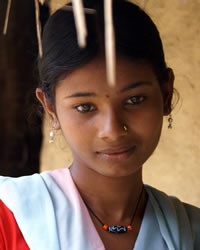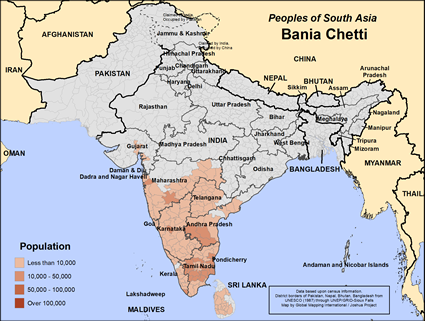Bania Chetti in India

Photo Source:
Copyrighted © 2026
Isudas All rights reserved. Used with permission |

Map Source:
People Group data: Omid. Map geography: UNESCO / GMI. Map Design: Joshua Project.
|
| People Name: | Bania Chetti |
| Country: | India |
| 10/40 Window: | Yes |
| Population: | 742,000 |
| World Population: | 748,800 |
| Primary Language: | Tamil |
| Primary Religion: | Hinduism |
| Christian Adherents: | 0.00 % |
| Evangelicals: | 0.00 % |
| Scripture: | Complete Bible |
| Ministry Resources: | Yes |
| Jesus Film: | Yes |
| Audio Recordings: | Yes |
| People Cluster: | South Asia Forward Caste - Bania |
| Affinity Bloc: | South Asian Peoples |
| Progress Level: |
|
Introduction / History
The Chetti or Chettiar are part of the large business caste of Bania in India. The word Chetti means trader or merchant. The Chetti are some of the most successful businesspersons in south India. They founded many of the leading banks of India. They are also involved in finance, real estate, entertainment, textiles, timber and grains. The Chetti own tea and coffee plantations, which are farmed by other castes. With the decline of the British Empire after WW2, many of the Chetti landholdings, businesses and banks were nationalized by the new countries. Many Chetti had to return to India and start a new life.
Chetti families encourage their sons to get MBAs and other advanced degrees. Most Chetti women do not work in business but take care of the home.
The primary language of the Chetti is Tamil. As educated Indians they also speak English, which allows them to do business throughout the world.
Where Are they Located?
Most Chetti live in the south Indian states of Tamil Nadu, Karnataka, Andhra Pradesh and Kerala. Smaller groups live throughout India and in the island nation of Sri Lanka.
What Are Their Lives Like?
Some of the most wealthy and successful people in south India are Bania Chetti. They own large businesses, banks and commercial enterprises. Some work for salaries in private companies and government.
The Chetti marry within their Bania caste often to families with the same level of income and property. Families arrange marriages with the consent of the young people. Sons inherit property from their fathers. Weddings are held at mansions owned by other Chetti. Brahmin priests officiate at important family occasions like births, weddings and funerals.
Outlookindia.com describes Chetti are secretive, practical, traditional land and business owners. Chettiar women rarely join family businesses but focus on the families' cultural and philanthropic initiatives. The Chetti support Hindu scholarship and temples as well as traditional Tamil art and literature.
As Hindus the Chetti do not eat beef. Sons are frequently named after their grandfathers and daughters after their grandmothers.
What Are Their Beliefs?
The Bania Chetti practice Hinduism, the ancient religion of India. They worship and serve the gods of the Hindu pantheon. Hindus believe that by performing rituals and good works that they will attain moksha or freedom from the endless cycle of birth, death and rebirth. The Chetti visit Hindu temples and offer prayers, food, flowers and incense to their gods. There are many forms of Hinduism, each with its own deities and beliefs.
The main yearly holidays of the Chetti people are Holi, the festival of colors, Diwali, the festival of lights, Navratri, the celebration of autumn and Rama Navami, Rama's birthday.
What Are Their Needs?
The Bania Chetti need to hear the life-changing message of Jesus Christ. They need to see that money, possessions and Hinduism will not bring the peace of mind and joy that they are seeking. They come to realize that they are sinners in need of the Savior.
Prayer Points
Pray that the Lord leads south Indian Christians to befriend the Chetti and introduce them to the Lord Jesus.
Pray that God will give them a distain for the Hindu gods and a desire for the Biblical Triune God and His Word.
Pray that God leads the Chetti to Christian literature and websites to learn about the Bible and the Lord Jesus.